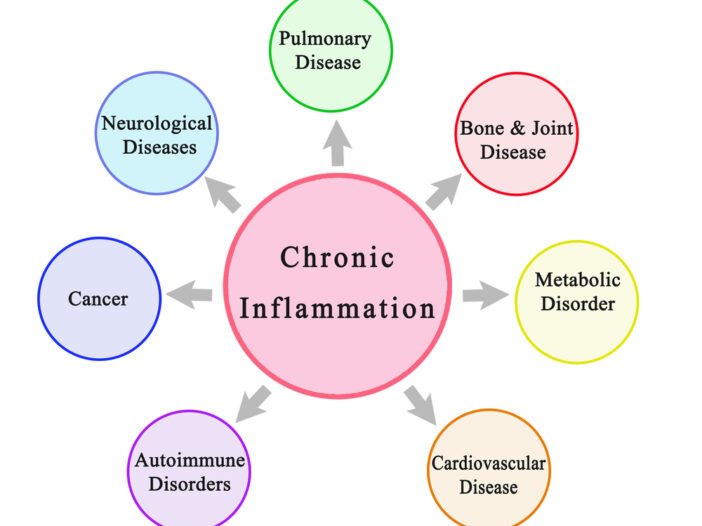
Inflammation is a term many people are familiar with, yet its complexity and impact on health are often misunderstood. It is a fundamental biological response, playing a crucial role in our body’s defence mechanism. However, when it goes unchecked, inflammation can transition from a protective measure to a chronic condition, contributing to numerous health issues. This blog aims to elucidate the science behind inflammation, its various forms, contributing factors, and how we can manage it through nutrition and lifestyle.
What is Inflammation?
Inflammation is part of our immune system’s response to harm. It’s our body’s way of signalling the immune system to heal and repair damaged tissue, as well as defend against foreign invaders like viruses and bacteria. For instance, when you cut yourself, your body responds with inflammation, characterised by swelling, redness, and warmth at the injury site. This acute inflammation is beneficial and necessary for healing.
However, inflammation isn’t always beneficial. When the immune system is persistently activated, it can lead to chronic inflammation. This prolonged state of inflammation is linked to numerous health conditions, including diabetes, obesity, heart disease, and cancer.
Types of Inflammation
Inflammation can be broadly classified into acute and chronic inflammation. Acute inflammation is the immediate response to an injury or infection, characterised by redness, swelling, and pain. This type of inflammation is usually short-lived and subsides once the healing process is underway.
Chronic inflammation, on the other hand, is a prolonged inflammatory response that can last for months or even years. It can be further divided into high-grade and low-grade inflammation. High-grade chronic inflammation is often noticeable, with clear symptoms like pain and swelling, as seen in autoimmune conditions like rheumatoid arthritis. Low-grade chronic inflammation is more insidious and can go unnoticed, contributing silently to various chronic diseases.
Contributing Factors to Chronic Inflammation
Several factors can contribute to the onset and persistence of chronic inflammation:
Ageing: As we age, our immune system becomes less efficient, leading to a state of constant low-level inflammation, often referred to as “inflammaging.”
Stress: Chronic stress can keep the body’s stress response activated, leading to prolonged inflammation. Cortisol, the hormone released during stress, can suppress the immune system, exacerbating inflammatory responses.
Sedentary Lifestyle: Lack of physical activity can increase pro-inflammatory molecules in the body and reduce anti-inflammatory ones.
Poor Sleep: Sleep deprivation disrupts the body’s natural immune response and increases levels of inflammatory markers.
Environmental Toxins: Exposure to pollutants, chemicals, and heavy metals can trigger immune responses leading to chronic inflammation.
Underlying Infections and Poor Gut Health: Chronic infections and an imbalance of gut bacteria can keep the immune system on high alert, contributing to persistent inflammation.
Modern Diets: Diets high in refined carbohydrates, sugars, unhealthy fats, and low in fibre contribute significantly to chronic inflammation.
The Role of Diet in Inflammation
Our modern diets are a major contributor to chronic inflammation. Foods high in refined sugars, unhealthy fats, and additives can trigger inflammatory responses in the body. Conversely, certain foods can help reduce inflammation.
Refined Carbohydrates and Sugar: Consuming high amounts of refined carbs and sugars can cause blood sugar spikes and crashes, promoting inflammation. High insulin levels stimulate the production of pro-inflammatory molecules.
Processed Foods: These are typically high in sugar, salt, unhealthy fats, and additives, all of which contribute to chronic inflammation. Trans fats and certain saturated fats can activate inflammatory pathways.
Fatty Acid Imbalance: Modern diets often have too much omega-6 fatty acids and not enough omega-3s. Omega-6 fatty acids promote inflammation, while omega-3s have anti-inflammatory properties.
Low Fibre Intake: Fibre is crucial for gut health and helps control blood sugar. A low-fibre diet can lead to an imbalance of gut bacteria, promoting gut inflammation and systemic inflammatory responses.
Overeating: Consistently consuming more calories than needed can lead to weight gain and obesity, which are associated with metabolic dysfunction and chronic inflammation.
Reducing Inflammation through Nutrition and Lifestyle
Adopting a Mediterranean diet is one of the most effective ways to combat chronic inflammation. This diet emphasises fresh fruits, vegetables, lean proteins like fish, whole grains, legumes, and healthy fats like olive oil. Studies have shown that people following a Mediterranean-type diet have a lower risk of heart disease, stroke, dementia, and other conditions linked to inflammation.
Here are some practical steps to reduce inflammation through diet and lifestyle:
Eat Whole Foods: Focus on fresh, unprocessed foods. Ditch ultra-processed foods that are high in unhealthy fats and sugar.
Reduce Sugar Intake: Be mindful of hidden sugars in processed foods. Read labels and avoid items with added sugars, such as sugary drinks, snacks, and sauces.
Increase Fibre Intake: Incorporate more fibre-rich foods into your diet, such as vegetables, fruits, legumes, and whole grains. Fibre helps maintain a healthy gut and regulates blood sugar levels.
Balance Fatty Acids: Reduce intake of omega-6 fatty acids found in many vegetable oils and increase omega-3s found in fatty fish, flaxseeds, and walnuts.
Stay Active: Regular physical activity helps reduce inflammation and maintain a healthy weight.
Manage Stress: Practice stress-reducing techniques such as meditation, yoga, or deep-breathing exercises to lower cortisol levels and inflammation.
Get Quality Sleep: Ensure you get sufficient, restful sleep to support your immune system and reduce inflammation.
Avoid Environmental Toxins: Minimise exposure to pollutants and chemicals by choosing natural, eco-friendly products and reducing use of synthetic substances.
Conclusion
Inflammation is a double-edged sword in our body’s defence system. While acute inflammation is crucial for healing, chronic inflammation can lead to a myriad of health issues. Understanding the factors that contribute to chronic inflammation and adopting a lifestyle and diet that mitigate these factors can significantly improve overall health. By making informed choices and focusing on whole, nutrient-dense foods, regular physical activity, and stress management, we can effectively reduce the risk of chronic inflammation and enhance our well-being.
